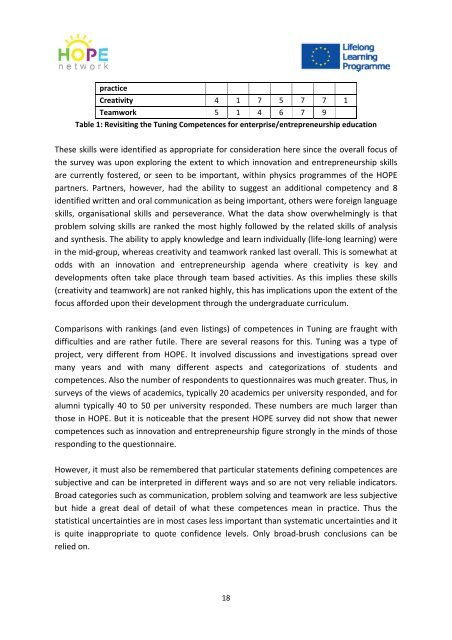New Competences for Physics Graduates Fostering Innovation and Entrepreneurship
Final-report_WG2_26dec2016
Final-report_WG2_26dec2016
Create successful ePaper yourself
Turn your PDF publications into a flip-book with our unique Google optimized e-Paper software.
practice<br />
Creativity 4 1 7 5 7 7 1<br />
Teamwork 5 1 4 6 7 9<br />
Table 1: Revisiting the Tuning <strong>Competences</strong> <strong>for</strong> enterprise/entrepreneurship education<br />
These skills were identified as appropriate <strong>for</strong> consideration here since the overall focus of<br />
the survey was upon exploring the extent to which innovation <strong>and</strong> entrepreneurship skills<br />
are currently fostered, or seen to be important, within physics programmes of the HOPE<br />
partners. Partners, however, had the ability to suggest an additional competency <strong>and</strong> 8<br />
identified written <strong>and</strong> oral communication as being important, others were <strong>for</strong>eign language<br />
skills, organisational skills <strong>and</strong> perseverance. What the data show overwhelmingly is that<br />
problem solving skills are ranked the most highly followed by the related skills of analysis<br />
<strong>and</strong> synthesis. The ability to apply knowledge <strong>and</strong> learn individually (life‐long learning) were<br />
in the mid‐group, whereas creativity <strong>and</strong> teamwork ranked last overall. This is somewhat at<br />
odds with an innovation <strong>and</strong> entrepreneurship agenda where creativity is key <strong>and</strong><br />
developments often take place through team based activities. As this implies these skills<br />
(creativity <strong>and</strong> teamwork) are not ranked highly, this has implications upon the extent of the<br />
focus af<strong>for</strong>ded upon their development through the undergraduate curriculum.<br />
Comparisons with rankings (<strong>and</strong> even listings) of competences in Tuning are fraught with<br />
difficulties <strong>and</strong> are rather futile. There are several reasons <strong>for</strong> this. Tuning was a type of<br />
project, very different from HOPE. It involved discussions <strong>and</strong> investigations spread over<br />
many years <strong>and</strong> with many different aspects <strong>and</strong> categorizations of students <strong>and</strong><br />
competences. Also the number of respondents to questionnaires was much greater. Thus, in<br />
surveys of the views of academics, typically 20 academics per university responded, <strong>and</strong> <strong>for</strong><br />
alumni typically 40 to 50 per university responded. These numbers are much larger than<br />
those in HOPE. But it is noticeable that the present HOPE survey did not show that newer<br />
competences such as innovation <strong>and</strong> entrepreneurship figure strongly in the minds of those<br />
responding to the questionnaire.<br />
However, it must also be remembered that particular statements defining competences are<br />
subjective <strong>and</strong> can be interpreted in different ways <strong>and</strong> so are not very reliable indicators.<br />
Broad categories such as communication, problem solving <strong>and</strong> teamwork are less subjective<br />
but hide a great deal of detail of what these competences mean in practice. Thus the<br />
statistical uncertainties are in most cases less important than systematic uncertainties <strong>and</strong> it<br />
is quite inappropriate to quote confidence levels. Only broad‐brush conclusions can be<br />
relied on.<br />
18


